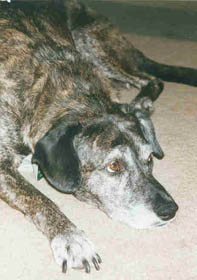 
Now, as he perceived that Odysseus had come close to him, he wagged his tail, and laid both his ears back; only he no longer had the strength to move any closer to his master, who, watching him from a distance, without Eumaios noticing, secretly wiped a tear away, and said to him: ‘Eumaios, this is amazing, this dog that lies on the dunghill. The shape of him is splendid, and yet I cannot be certain whether he had the running speed to go with this beauty, or is just one of the kind of table dog that gentlemen keep, and it is only for show that their masters care for them.’ If he were such, in build and in performance, as when Odysseus left him behind, when he went to Ilion, soon you could see his speed and his strength for yourself. Never could any wild animal, in the profound depths of the forest, escape, once he pursued. He was very clever at tracking. But now he is in bad times. His master, far from his country, has perished, and the women are careless, and do not look after him; and serving men, when their masters are no longer about, to make them work, are no longer willing to do their rightful duties. For Zeus of the wide brows takes away one half of the virtue from a man, once the day of slavery closes upon him.’ So he spoke, and went into the strongly-settled palace, and strode straight on, to the great hall and haughty suitors, but the doom of dark death now closed over the dog, Argos, when, after nineteen years had gone by, he had seen Odysseus.” The Odyssey, Book XVII. |
|
Go Back |